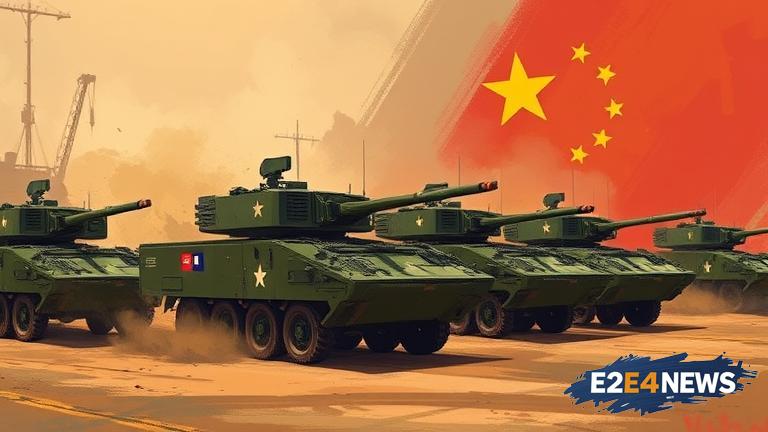Taiwan has been actively working to strengthen its defense capabilities in recent years, driven by the increasing tensions with China. The Taiwanese government has been investing heavily in the development of indigenous defense technologies, including the production of submarines, fighter jets, and missile systems. This move is aimed at reducing the country’s dependence on foreign arms suppliers and enhancing its self-sufficiency in defense. Furthermore, Taiwan has been engaging in international cooperation with like-minded countries to enhance its defense capabilities and promote regional stability. The country has been participating in various military exercises and training programs with its partners, including the United States, Japan, and Australia. These efforts are designed to improve Taiwan’s military interoperability and enhance its ability to respond to potential security threats. In addition, Taiwan has been strengthening its cyber security capabilities, recognizing the growing importance of cyber warfare in modern conflict. The country has established a dedicated cyber security agency and has been investing in the development of advanced cyber security technologies. Taiwan’s defense strategy is focused on asymmetric warfare, which emphasizes the use of unconventional tactics and strategies to counter the superior military might of China. The country’s military has been developing capabilities in areas such as missile defense, electronic warfare, and special operations. Taiwan has also been enhancing its military readiness, with a focus on improving its response time and mobility. The country’s defense budget has been increasing in recent years, reflecting the growing importance of defense in Taiwan’s national security strategy. Despite these efforts, Taiwan still faces significant security challenges, including the threat of invasion by China. The Taiwanese government has been seeking to enhance its international support and cooperation, recognizing that its security is closely tied to the stability of the region. The country has been participating in various regional security forums and has been seeking to strengthen its ties with like-minded countries. Taiwan’s defense capabilities are also closely linked to its economic development, with the country seeking to leverage its technological advancements to enhance its military capabilities. The Taiwanese government has been investing in the development of advanced technologies, including artificial intelligence, robotics, and nanotechnology, which have potential military applications. In conclusion, Taiwan is taking a multi-faceted approach to enhancing its defense capabilities, recognizing the growing security challenges it faces. The country’s focus on indigenous development, international cooperation, and asymmetric warfare is designed to enhance its military capabilities and promote regional stability. With the ongoing tensions with China, Taiwan’s defense strategy is likely to remain a key focus of the country’s national security policy in the coming years. The international community is watching the situation closely, recognizing the potential implications for regional stability and global security. As the situation continues to evolve, it is likely that Taiwan will remain a key player in regional security dynamics, with its defense capabilities playing a critical role in shaping the country’s future. The country’s ability to balance its defense needs with its economic development goals will be crucial in determining its long-term security and stability. Taiwan’s experience in enhancing its defense capabilities may also provide valuable lessons for other countries facing similar security challenges. The country’s commitment to international cooperation and its focus on asymmetric warfare may serve as a model for other nations seeking to enhance their military capabilities in the face of superior adversaries. Ultimately, the success of Taiwan’s defense strategy will depend on its ability to adapt to the evolving security landscape and to leverage its unique strengths and advantages to promote regional stability and security.





